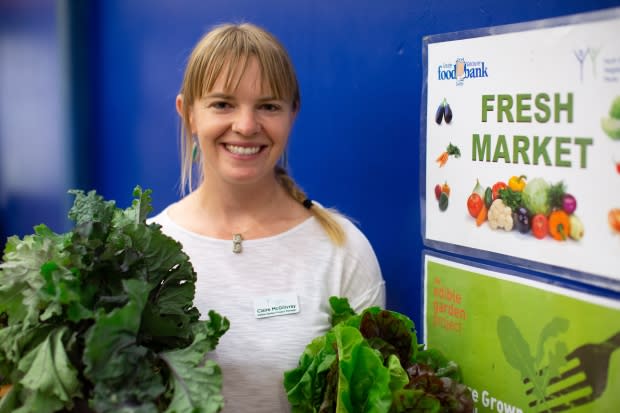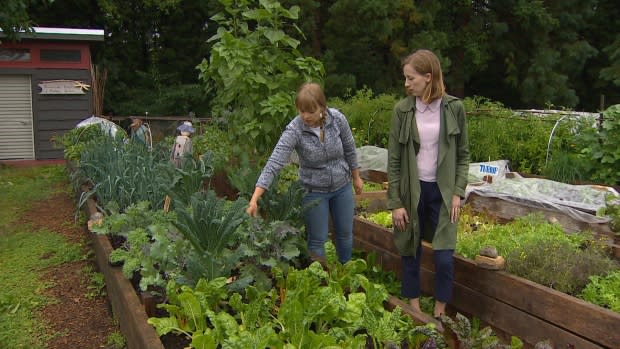'Picked with TLC': Food bank users eating up fresh produce from volunteer gardens
A collection of gardens in North Vancouver is being used to help food bank users boost their diet with a bounty of greens.
The five sharing gardens are located in backyards, schoolyards and churches, with the largest outside Sutherland Secondary School.
"It's fresh and it's picked with TLC," said Jeanette Bertelsen, a widow on a fixed income who uses the food bank.
A group of up to 70 volunteers make sure the gardens flourish by planting, weeding and harvesting the beds year-round.
"It's a lot of retired people that are wanting to fill their time with something meaningful," said Claire McGillivray, program manager with the Edible Garden Project, which the sharing gardens are a part of.
"They love that the produce they're growing is actually going to people that otherwise maybe wouldn't have access to fresh produce," McGillivray said.

Every week, the volunteers harvest veggies like peas, carrots, kale and tomatoes to bring to a food bank hub at the North Shore Neighbourhood House.
The produce is sold to food bank users at a fraction of the price they'd find in grocery stores, with most items going for 25 to 50 cents [a bunch or a bag] each.
Bertelsen also volunteers for the food bank every week.
"It's hard. You live from payday to payday. And that's why I love coming here on a Wednesday for the edible garden. It's so good," Bertelsen said.

Her favourite is the "nice and hot" radishes.
Twenty five cents here. So it's like half the price," she said.
The funds go toward buying seeds and supporting the project, which relies on money from grants to operate.
McGillivray said charging a small amount of money for the food also gives people the dignity of paying for a product, and of deciding what they want to purchase.
"At our stand, they can choose exactly what they want to have. If they don't like a certain vegetable, they don't have to take it," she said.

The idea for the sharing gardens sprung up in 2013, after volunteers noticed the food bank didn't always have a lot of fresh produce for people. It's been operating ever since.
Nowadays, the Greater Vancouver Food Bank said the idea of the food bank as a place for cans and dried goods is rapidly changing.
The past year, it took in 4.7 million pounds of food. About 55 per cent of that was fresh, according to chief development officer Cynthia Boulter.
"They're coming in from grocery retailers, as well as the farmers that we deal with directly. And it's beautiful produce," Boulter said.
Still, the sharing garden stand sells out almost every week. A massive lineup greets the team at the stand every Wednesday at 9 a.m.


